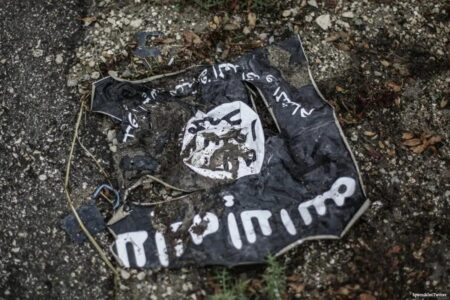
UK charges alleged Daesh member with terror offences after Turkiye deports him
An alleged member of the Daesh terror group and its ‘Beatles’ cell made up of British militants was charged with terrorism offences after being arrested upon his arrival in the UK.
Following his deportation from Turkiye on Wednesday – where he was detained in a maximum-security prison for seven-and-a-half years – and his arrival on British soil, 38-year-old Aine Davis was arrested at Luton Airport and yesterday appeared in court. The Crown Prosecution Service then announced that Davis was “charged with terrorism offences and possession of a firearm for a purpose connected with terrorism.”
He is accused of having been part of Daesh and its ‘Beatles’ cell, which was said to have been led by another British member named Mohammed Emwazi. During the group’s control of large swathes of territory in Iraq and Syria in the mid-2010s, the cell was reportedly responsible for guarding and executing Western hostages.
In November 2015, Aine and other suspected Daesh members were arrested during a raid by Turkish counter-terrorism forces on an Istanbul villa. That property had been rented by the Federal Bureau of Investigation (FBI) – the United States’ domestic intelligence agency – before it alerted Turkish authorities to the individuals’ presence and a false terror plot, in what turned out to be an apparent entrapment operation.
Davis reiterated his denial of being a Daesh member during the hearing, stating that he travelled to Syria in the early years of its ongoing civil war for aid work. He claiming that he was linked to Emwazi only due to their common attendance at the same London mosque.
He also told the court that pictures showing him posing with weapons and armed militants were misunderstood. “I had those photos as a sort of joke. Everyone was having photos taken with armed individuals like that in order to show off.” He added: “I do not know who those people in the photos were or which group they were in.”
Prosecutors, however, pushed back by citing intercepted phone messages which reportedly proved he had been in contact with identified Daesh operatives and had requested assistance in crossing the Syrian border into Turkiye for an “important meeting” and to “engage in provocative and sensational actions”.
They also cited a red notice against him by the international policing organisation Interpol, which was filed by British police and was based on content from his wife’s phone which consisted of pictures of him with “guns, an Islamic flag, a dead martyr and other individuals who are also armed”.
Source: Middle East Monitor





